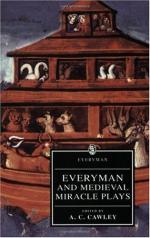|
This section contains 750 words (approx. 2 pages at 400 words per page) |

|
Part 7 Summary
"The N. Town Cycle - The Woman Taken in Adultery" The editor comments on how well this particular Bible story (based, he says, on the Gospel of John, chapter 8, verses 3 to 11) is dramatized. "It would be difficult," he writes, "to find a more successful example of a biblical story grafted on to the stem of medieval life." He goes on to suggest that "while the human interest of the episode is exploited to the full, its Christian meaning—the quality of divine mercy—is also made plain."
The Pageant - In a speech that is part prologue (spoken for the audience's benefit) and part drama (spoken to listeners at a temple), Jesus preaches the doctrine of mercy, describing himself as having been sent from God to lead the people to grace and faith (see "Quotes", p. 128).
Scene 1 - A Pharisee (lawgiver...
(read more from the Part 7 Summary)
|
This section contains 750 words (approx. 2 pages at 400 words per page) |

|




